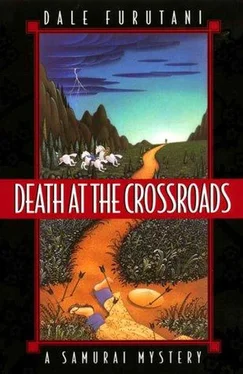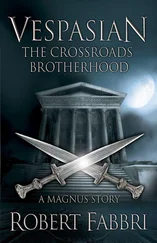Dale Furutani - Death at the Crossroads
Здесь есть возможность читать онлайн «Dale Furutani - Death at the Crossroads» весь текст электронной книги совершенно бесплатно (целиком полную версию без сокращений). В некоторых случаях можно слушать аудио, скачать через торрент в формате fb2 и присутствует краткое содержание. Год выпуска: 2011, ISBN: 2011, Жанр: Исторический детектив, на английском языке. Описание произведения, (предисловие) а так же отзывы посетителей доступны на портале библиотеки ЛибКат.
- Название:Death at the Crossroads
- Автор:
- Жанр:
- Год:2011
- ISBN:068815817X
- Рейтинг книги:3 / 5. Голосов: 1
-
Избранное:Добавить в избранное
- Отзывы:
-
Ваша оценка:
- 60
- 1
- 2
- 3
- 4
- 5
Death at the Crossroads: краткое содержание, описание и аннотация
Предлагаем к чтению аннотацию, описание, краткое содержание или предисловие (зависит от того, что написал сам автор книги «Death at the Crossroads»). Если вы не нашли необходимую информацию о книге — напишите в комментариях, мы постараемся отыскать её.
Death at the Crossroads — читать онлайн бесплатно полную книгу (весь текст) целиком
Ниже представлен текст книги, разбитый по страницам. Система сохранения места последней прочитанной страницы, позволяет с удобством читать онлайн бесплатно книгу «Death at the Crossroads», без необходимости каждый раз заново искать на чём Вы остановились. Поставьте закладку, и сможете в любой момент перейти на страницу, на которой закончили чтение.
Интервал:
Закладка:
The Magistrate’s mother had married beneath her, and sending her firstborn to be adopted by the Nagatos was a further step down for the child. Since the child was not really a Hotta, his reputed father could adopt him out with no social stigma attached to the transaction. Hotta was a doting father to his own children, but the Magistrate was never given the privileges that a firstborn son should receive in a Japanese family, and even at an early age he knew it. When the child became a teenager, Hotta saw an opportunity to get rid of a longtime embarrassment and had him married and adopted into the Nagato family.
The Nagatos had no male heir, and they were using their daughter as a way to continue the Nagato name. A husband would be found for their daughter, and then the new son-in-law would be adopted into the family, assuming the Nagato name. Then the next generation would be “real” Nagatos.
Since the adoption could be undone, the Nagato family had tremendous power over the Magistrate, forcing him to put up with a meddling mother-in-law and a disobedient wife. The wife took strength and pleasure from her mother’s support and sharp tongue, and together they would regularly berate the man who was supposed to be the strong force in the District. It made Nagato feel small and impotent to be trapped in life by the indiscretion of his mother.
Still, Nagato thought, it was possible to better yourself even if you couldn’t undo a bad birth, a worse marriage, or a position as the vassal of a strange District Lord. It only required money, and money was what Nagato was focused on currently because he had a goal. He wanted a concubine.
Nagato’s wife had done her duty by bearing him a son; a small, nasty child that clung to, and acted like, his mother. Having done her duty, she was not expected to bring passion into his life. For that, a samurai was expected to find other women or boys. She, of course, was expected to remain faithful to him while he satisfied his appetites with others.
Nagato was a man of large appetites, but except for food, his appetites had been thwarted. Power, money, status, and women had eluded him. Now he was determined to change that. Money was the key, and once he had money, he could have the rest.
He idly thought about whom he would acquire as his concubine. That fool of a village headman, Ichiro, had a tasty eleven-year-old daughter who would do for a start. She was artless, but the thought of her taut skin brought a familiar stirring to his groin.
Nagato was taught that grace and delicacy were the marks of femininity, but the child was gawky and awkward and ran around the village like a boy. He was taught that soft flesh and a lack of muscle was desirable in a woman, but the child had bony limbs and she had already been hardened by a short lifetime filled with work. He was taught that refinement in the arts was erotic, but the child was ignorant in the ways of the Court and culture and only familiar with the life of a farmer. He was taught that the nape of a long, swanlike neck was the apex of feminine beauty, but her neck was short and stubby. Finally, as Nagato could see for himself when the child walked around, she had large peasant’s feet, not the tiny mincing feet he associated with a lovely woman.
Despite all this, the child still provoked Nagato’s lust for a simple reason: She was vulnerable.
How such a succulent morsel could come from that bag of bones of a village headman was beyond Nagato’s comprehension. He had often intimated that he would be willing to bestow his favors on the headman’s nubile daughter, but the peasant always seemed oblivious to what Nagato was talking about. Nagato sighed. Peasants were always so stupid! No matter; when the money was there he could simply buy the girl from the fool.
“ Tadaima! I’m home!” he gruffly shouted as he entered his house, which was bigger and grander than that of the peasants in the village. He sat at the entryway and untied his sandals. His wizened mother-in-law came to greet him, instead of his wife, as was proper. She curled up her nose as she approached him.
“You smell of that place again. You’ve been up to see the Lord. Wash your dirty body before you come into the house,” the old woman ordered.
Nagato’s lips twisted with frustration and hatred, but he stepped outside to comply.
CHAPTER 4
A warm fire with a
kettle bubbling over it.
It’s good to have friends.
“Food?”
“Yes.”
Jiro ladled out some porridge made from millet and brown rice into a bowl. He begrudged the use of rice in the meal, but he thought he should add it to the millet or the samurai might get angry with him.
Both men were in Jiro’s farmhouse, sitting on a raised wooden platform that formed the main flooring for the hut. The farmhouse was perhaps eight paces long by six wide, with a high thatched roof, the underside of which was made black with soot. In the joists of the roof, crude platforms of bamboo were built to act as storage places. The walls of the hut were planks hand sawn but painstakingly fitted together so the biting winds of winter would not cut through the joints to freeze the inhabitants of the hut. The planks fitted between posts and beams, many of which were left in a seminatural shape: the bark and limbs trimmed off, but the natural shape of the trunk remaining. Like the underside of the thatch, all the wood had been smoked to a dark color by countless fires used to provide heat and to cook food. The entire house was put together with cunning joints that locked it together, along with a few pegs.
The fire was made in a gap in the center of the platform that Jiro and Kaze sat on. There, in an open square in the floorboards, a charcoal fire was glowing on the exposed ground below. Hanging over the fire, from a rope thrown over a beam in the roof, was an iron pot with the bubbling porridge. By raising or lowering the other end of the rope and tying it off, Jiro could control the cooking temperature.
A steady stream of gray wisps rose from the fire and curled past the pot, wafting up into the recesses of the thatched roof. It was supposed to escape through a hole in the eaves, but the truth was that a great deal of the smoke remained to permeate the entire farmhouse, causing watery eyes and drying the throat to a leathery consistency.
High in the rafters, on the ridgepole of the roof, was a black-painted arrow pointing northeast, the kimon , or devil’s direction. The arrow was tied with hemp rope, a Shinto ceremonial article, and it was designed to keep away evil spirits. Jiro’s grandfather and the carpenter who supervised the building of the house had tied the arrow there as part of the construction rites more than ninety years before. The entire village had participated in the construction of the house, just as Jiro, his father, and his father before him had participated in the construction of all the other houses in the village. If a house survived earthquakes, fires, and war, it might stay in a family for hundreds of years, little bits of it being constantly renewed and replaced as age and rot took their toll. In that way it was like a family or the village itself because the long-term survival of the whole was more important than the survival of any individual piece.
Jiro handed the bowl of porridge over to Kaze. As Kaze accepted the bowl, he did something astonishing. He gave a small nod of his head to acknowledge the food and thank Jiro. In his entire fifty years, Jiro had never had a samurai thank him for anything, much less give a bow to him, however small. He almost dropped the ladle.
Kaze acted as if he had done nothing unusual. He brought the bowl to his face and, using a pair of hashi , chopsticks, he shoveled some of the porridge into his mouth, sucking air in along with porridge to cool the hot mixture. “It’s good,” he said.
Читать дальшеИнтервал:
Закладка:
Похожие книги на «Death at the Crossroads»
Представляем Вашему вниманию похожие книги на «Death at the Crossroads» списком для выбора. Мы отобрали схожую по названию и смыслу литературу в надежде предоставить читателям больше вариантов отыскать новые, интересные, ещё непрочитанные произведения.
Обсуждение, отзывы о книге «Death at the Crossroads» и просто собственные мнения читателей. Оставьте ваши комментарии, напишите, что Вы думаете о произведении, его смысле или главных героях. Укажите что конкретно понравилось, а что нет, и почему Вы так считаете.












